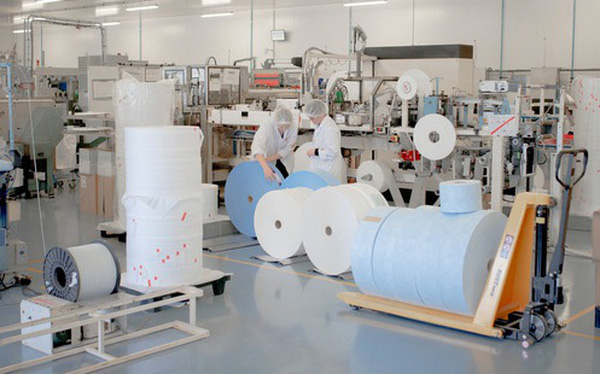The New York Times: How are medical masks being supplemented globally?
- Tram Ho

The constant sounds of machinery echoed across the French factory floor this week as a result of the deadly virus that has crippled cities in China and other parts of Asia. Kolmi Hopen, a company that specializes in manufacturing “suddenly”, is one of the hottest products in the world: medical masks.
The Angers factory, which typically produces about 170 million masks each year, but last week, orders reached half a billion, exploding the sales department’s inbox at a rate of two minutes. . Kolmi Hopen is racing to hire more workers and keep the machines running 24 hours a day, 7 days a week.
Guillaume Laverdure, managing director of Canada-based Kolmi Hopen’s parent company, said, ” We are producing masks as quickly as possible .” “However, the demand continues to increase,” he added.
Most masks in the world are made in China and Taiwan. But the factories there, including those operated by Medicom, were forced to temporarily stop exporting to comply with the government’s requirements for stockpiling of this item.
On Monday, the Chinese government acknowledged that it desperately needed medical masks and other protective equipment, and said it would start importing from Europe, Japan, and the United States to make up for deficiency.
“The need is particularly strong for highly filterable respirators, which may be more effective for the spread of virus-containing droplets than for conventional medical masks,” Laverdure said. Another factory of the Medicom mask maker, in Augusta, Ga., Is also increasing production.
Scientists say there is not much evidence that masks can really protect people from the possibility of virus infection. Hand washing may be more important. However, when the corona virus spread, with thousands of confirmed cases and hundreds of deaths, experts feared that the supply of masks and other sanitary ware would be exhausted in Other countries. Pharmacies in the United States have begun to report a shortage.
“Frantic” orders at Kolmi Hopen indicate the large-scale disruption that China can create in the global supply chain for even the most specialized products, if its factories are not operating. Max productivity.
China alone produces about half of the mask worldwide – about 20 million a day, or more than seven billion a year, supplying hospitals and health care workers in many countries. Taiwan accounts for 20% of global supply.
Production has been slowing down when Chinese factories shut down for the Chinese New Year holiday in early January. Some locations around Wuhan, the epicenter of the corona virus outbreak, have not yet fully recovered and is operating at around 60% capacity, according to the Chinese Government.
Medicom’s factory in Wuhan, which produces surgical gowns, is one of the factories that has delayed reopening. The company’s facial mask production site in Taiwan is no longer allowed to be exported.
Shortages of supply can be made worse by the fact that mask components and respirators are manufactured in many different countries. More than 90% of medical masks sold in the United States are manufactured overseas, according to the U.S. Department of Health and Human Services. Components – or sometimes final assembly – may depend not only on China and Taiwan but also in Japan, Vietnam, Mexico and Colombia.
With traffic from China to the outside world dwindling, medical device suppliers across the globe, including giants like Honeywell and 3M, are scrambling to find alternative sources. . Both companies said through representatives that they were experiencing increased demand and were turning to increasing production wherever they could.
Prestige Ameritech, a mask manufacturer in North Richland Hills, Texas, is one of the companies receiving international orders when the corona virus has spread to 24 countries and territories in the past few weeks, including from Hong. Kong, Singapore and Taiwan.
“I receive thousands of emails from customers in Asia,” said Mike Bowen, executive vice president. “Last week, I sent over a million masks to China. It was something I never expected.”
Even the smallest manufacturers don’t “escape”.
After the corona virus attack, Pardam – a small company in the Czech Republic producing nanofibers is turning to automation to increase production, according to Jiri Kus, President of the Czech Association of Nanotechnology Industry.
The Medicom factory in Angers has added 30 new workers for the purpose of shifting to production around the clock. The company is pumping out more than one million masks a day, double the normal amount, Mr. Laverdure said.
Medicom has experienced “struggling” with the SARS, H1N1 and Ebola virus crises. When reports of the corona virus appeared in December, executives held a meeting at their headquarters in Montreal to monitor development and produce production plans for locations in Europe and North America and at their factories in Wuhan, Shanghai and Taiwan.
“Demand will not stop,” Mr. Laverdure said. “The situation is going dizzy.”
The article records everything that happens in the corona virus epidemic in the Economic Impact folder on the Corona Virus Shield page for the most useful and reliable information.
Source : Genk
